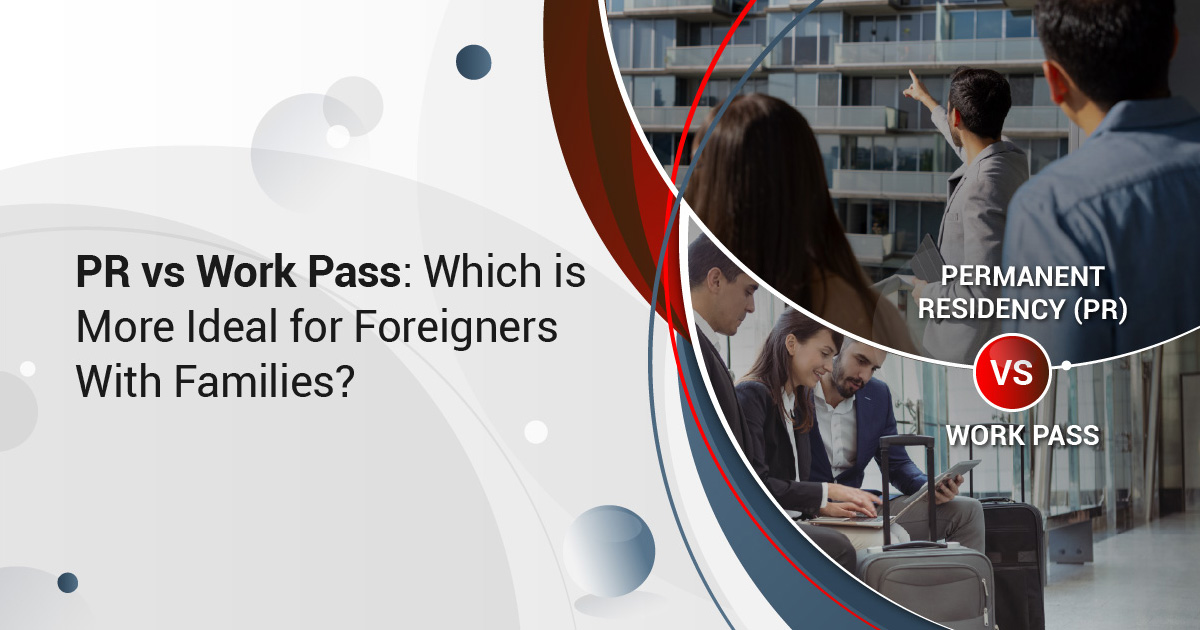For foreign professionals building a life in Singapore, the decision to settle long-term often hinges on one critical choice: pursuing Permanent Residency (PR) or continuing on a Work Pass. While both paths allow you to live and work in this dynamic city-state, they offer vastly different levels of stability, benefits, and long-term prospects, especially for those with families.
Understanding the nuances between a Work Pass, such as an Employment Pass (EP), and PR status is crucial for making an informed decision that aligns with your family’s future goals. This guide compares these two options across key factors to help you determine which is more ideal for your circumstances.
Key Takeaways
- PR offers long-term residency and job flexibility, while Work Passes are tied to employment and subject to renewal.
- PR provides access to subsidised public education, healthcare, and housing options, making it more family-friendly compared to Work Passes.
- PR allows job changes without additional approvals, unlike Work Passes, which require new applications for each job change.
- The PR application process is competitive and holistic, requiring professional guidance to maximise success.
The Fundamental Difference: Stability and Security

The most significant distinction between a Work Pass and PR lies in the level of stability each provides. This single factor has profound implications for every aspect of family life, from housing and education to career mobility.
A Work Pass is temporary and tied directly to your employment. Your legal right to reside in Singapore, along with that of your dependent family members, is contingent upon your job. Should you lose your job, your pass (and your Dependant’s Passes) will be cancelled, leaving you with a limited timeframe to find new employment or make arrangements to leave the country. This dependency creates a persistent sense of uncertainty, making long-term planning a challenge.
Permanent Residency (PR), on the other hand, grants you the right to live, work, and travel in and out of Singapore without being tied to a specific employer. As a PR, you are no longer a guest but a stakeholder in the nation. This status provides immense peace of mind and a stable foundation upon which your family can build a future, secure in the knowledge that your residency is not dependent on your current job.
Comparing Key Factors for Families
Let us break down the practical differences between a Work Pass and PR across areas that matter most to families.
1. Job Flexibility and Career Growth
- Work Pass: Your career mobility is restricted. Changing jobs requires your new employer to apply for a new work pass on your behalf. The application is subject to the prevailing eligibility criteria at that time, including salary and qualifications. There is no guarantee of approval, which can limit your willingness to explore better opportunities.
- PR: As a PR, you can change jobs freely without seeking approval from the Ministry of Manpower (MOM). This flexibility allows you to pursue career advancement, start your own business, or even take a break from work without jeopardising your right to stay in Singapore. Your career path is dictated by your ambitions, not by immigration constraints.
2. Education for Your Children

This is often the most compelling reason for families to seek PR status.
- Work Pass: Children of Employment Pass holders are on Dependant’s Passes and can attend international schools. To enroll in a local public school, they are placed in the lowest priority group (Phase 3 for Primary 1 registration), making admission extremely difficult due to high demand. School fees for foreigners are also significantly higher than those for citizens and PRs.
- PR: Children who are granted PR status gain second-priority access to Singapore’s world-class public education system, just after Singapore Citizens. This dramatically increases their chances of securing a place in a local school. Furthermore, school fees for PRs are substantially subsidised, resulting in significant cost savings over the course of a child’s education.
3. Healthcare Access and Costs
Access to affordable, high-quality healthcare is a top priority for any family.
- Work Pass: As a foreigner, you do not have access to government healthcare subsidies. You must rely on your employer’s health insurance or purchase a private policy to cover medical expenses, which are charged at unsubsidised rates in public and private hospitals. PR: PRs are eligible for government healthcare subsidies at public hospitals and polyclinics. You can also participate in MediShield Life, a basic national health insurance plan, and contribute to your MediSave account through the CPF. This provides a crucial safety net and makes healthcare far more affordable.
4. Housing and Property Ownership
- Work Pass: You are restricted to renting property or purchasing private condominiums, which often come at a premium. You are not eligible to buy public housing (HDB flats).
- PR: After three years of obtaining PR status, you become eligible to purchase a resale HDB flat, which is generally more affordable than private property. PRs can also buy private property without facing the higher Additional Buyer’s Stamp Duty (ABSD) rates imposed on foreigners for their first residential property purchase.
5. Including Family Members
- Work Pass: You can apply for Dependant’s Passes (DP) for your legally married spouse and children under 21, provided you meet a minimum qualifying salary. Parents can be sponsored on a Long-Term Visit Pass (LTVP), but this is subject to a higher salary threshold and does not grant them long-term security.
- PR: When you apply for PR, you can include your spouse and unmarried children under 21 in your application. A successful application grants the entire family unit the same stable status. As a PR, you are also eligible to sponsor your parents for an LTVP, which is generally viewed more favorably.
The Central Provident Fund (CPF)
A unique benefit of PR is participation in the CPF scheme. Both you and your employer are required to make monthly contributions to your CPF accounts. This compulsory savings plan helps fund your retirement, healthcare (via MediSave), and can be used for purchasing property in Singapore. While it reduces your take-home pay, it builds a substantial financial asset for your long-term future. Work Pass holders are not part of this scheme.
Why Professional Guidance is Essential
The path to Singapore PR is highly competitive, and the Immigration & Checkpoints Authority (ICA) assesses each application holistically. Factors such as your economic contributions, qualifications, age, family profile, and length of stay are all considered.
A simple application form does not capture the full story of your commitment to Singapore. This is where an immigration specialist provides immense value. An expert can:
- Assess Your Profile: Evaluate your strengths and weaknesses to determine your eligibility and the optimal time to apply. Craft a Compelling Narrative: Help you articulate your social and economic contributions, showcasing your integration into Singaporean society and your family’s long-term intentions.Ensure Flawless Documentation: Guide you in preparing a complete and accurate application package to avoid unnecessary delays or rejections.
Investing in Your Family’s Future

While a work pass is a practical way to begin your professional journey in Singapore, it offers limited security for families with long-term aspirations. The uncertainties surrounding employment, education, and healthcare can create significant stress.
Permanent residency transcends these limitations, providing the stability, flexibility, and access to social benefits that allow a family to truly put down roots. It is an investment in a secure and prosperous future in Singapore. By consulting with an immigration specialist such as InCorp, you can navigate the complex application process with confidence and significantly enhance your chances of success.
FAQs about PR vs Work Pass
What is the main difference between a PR and a work pass?
- PR provides long-term residency and job flexibility in Singapore, while a work pass is tied to employment and must be renewed periodically. Losing your job on a work pass may require you to leave the country unless you secure new employment.
Is the PR or work pass better for expats with families?
- PR is generally more family-friendly as it offers access to subsidised public education, healthcare, and housing options. Work pass holders face higher costs for these services and limited access to public resources.
How competitive is the PR application process?
- The PR application process is highly competitive and considers factors like your economic contributions, qualifications, family profile, and integration into Singaporean society. Professional guidance can improve your chances of success.


